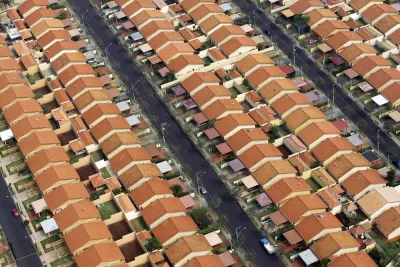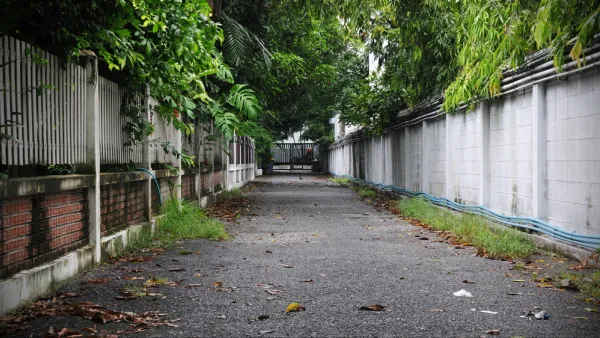It's not a popular viewpoint, but what if suburbs end up being more critical to a sustainable and efficient future than dense urban areas?

Randy Rieland reports on a proposition that might come as a shock, or even an affront, to some who call themselves urbanists: the future of the built environment could still be suburban.
Rieland relies on the ideas and research of Alan Berger, a professor of landscape architecture and urban design at MIT, who recently convened the "Future of Suburbia" conference. Among the speakers and futurists at the event, a much more environmentally friendly portrait of the suburbs emerged:
Their model of a future metropolitan area of 3 million people looks very different from what we’ve come to know. Rather than have neighborhoods continuously spreading outward from a downtown core, it presents a handful of dense clusters amid what Berger describes as a “big sea of suburban development that’s much more horizontal than vertical." It would, he says, function as a “kind of holistic sustainable machine.”
One key concept of Berger's argument: that U.N.'s 2014 "World Urbanization Prospects" report built a misconception that the majority of the world's population now lives in urban areas (i.e., not the suburbs). In fact, says Berger, most of those people are moving to suburbs. "Certainly, the world’s urbanizing, but it’s urbanizing in a much different way than cities," says Berger in a direct quote. "It’s urbanizing horizontally."
FULL STORY: Suburbia Gets No Respect, But It Could Become a Very Different Place

Analysis: Cybertruck Fatality Rate Far Exceeds That of Ford Pinto
The Tesla Cybertruck was recalled seven times last year.

National Parks Layoffs Will Cause Communities to Lose Billions
Thousands of essential park workers were laid off this week, just before the busy spring break season.

Retro-silient?: America’s First “Eco-burb,” The Woodlands Turns 50
A master-planned community north of Houston offers lessons on green infrastructure and resilient design, but falls short of its founder’s lofty affordability and walkability goals.

Test News Post 1
This is a summary

Analysis: Cybertruck Fatality Rate Far Exceeds That of Ford Pinto
The Tesla Cybertruck was recalled seven times last year.

Test News Headline 46
Test for the image on the front page.
Urban Design for Planners 1: Software Tools
This six-course series explores essential urban design concepts using open source software and equips planners with the tools they need to participate fully in the urban design process.
Planning for Universal Design
Learn the tools for implementing Universal Design in planning regulations.
EMC Planning Group, Inc.
Planetizen
Planetizen
Mpact (formerly Rail~Volution)
Great Falls Development Authority, Inc.
HUDs Office of Policy Development and Research
NYU Wagner Graduate School of Public Service



























